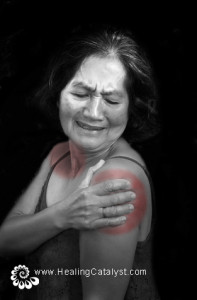Do you or someone you love suffer with fibromyalgia?
Fibromyalgia is the body’s accumulated response to deep emotional trauma that hasn’t been adequately acknowledged by self and others. The panoply of symptoms are a deep, desperate call for help from a tender part of a person that doesn’t know how to call out any other way.
Fibromyalgia patients need to be listened to – and they need to learn to listen to themselves!
Relief and even symptom reversal is possible as they learn to give themselves the love and attention they crave.
Fibromyalgia Patients Need to Be Listened To –
and Listen to Themselves!
If you have fibromyalgia, chronic pain, chronic fatigue, or love someone who does, you may be frustrated or perplexed by the varied and often conflicting information about these conditions. I have heard fibromyalgia (and chronic fatigue) described as “mysterious,” but if you look deeper than the presenting physical symptoms, the emotional and psychological components become clear. And when you adequately address the underlying emotional causes, the symptoms can diminish or disappear. People can and do get better as long as their care has a strong component of emotional support. This includes self support!
If you aren’t already familiar with them, you can read about the symptoms and causes of Fibromyalgia. Or check out the Fibromyalgia Network and all it’s resources. People with fibromyalgia cite infections, physical trauma (abuse, car accident), emotional trauma such as being in a war zone or the death of a close loved one, as potential initiating events. But there’s more to it.
Not everyone who goes through trauma develops fibromyalgia or chronic fatigue. With fibromyalgia we are seeing a loaded psyche simply refusing to “play nice” anymore. It’s as if the mind and body go into partnership saying, “We’re not willing to put our needs aside anymore. Listen to me, now!” What I’d really like you to hear about this syndrome[1] is that it’s a creative and life-affirming response to stress. It’s the body’s way of saying, “I’m at overload. I will not be dismissed, disrespected, or disregarded any more. I will make it increasingly impossible to function normally until you address the underlying emotional distress here.” Perhaps most importantly, the patient needs to listen to her or himself!!!
Despite widely-differing symptoms, what do all fibromyalgia patients have in common?
Differing symptoms, same roots
For decades I worked with people who danced around a diagnosis of Fibromyalgia – some taking refuge in having a name for their distress and others denying or defying it. Some wanted strong, deep massage; others could barely stand being touched. Some seemed emotionally hardy, others, tender. By focusing tightly on the specific symptoms, it’s easy to miss the big picture. I kept asking, What underlies all these different fibromyalgia profiles? Eventually I realized that they shared a deep need to be listened to and to have their distress respected – especially by themselves. Then I started testing my hypothesis and all the disparate pieces started fitting together.
Every person I have talked with about their fibromyalgia symptoms has experienced emotional trauma of some kind. It might have been subtle emotional abuse over years; a car accident; the shock of death or a divorce; or any number of things. However, because the scars of their experience are not visible or the trauma is in some way hard to define, they can’t point to the problem and get the understanding and caring attention they need – including from themselves. I would go so far as to say that what we call fibromyalgia is a body’s accumulated response when deep emotional trauma isn’t adequately acknowledged by self and others. When we brush distressing emotional aspects of a person’s experience under the carpet, the body steps in to pull up the rug so the wound can be seen and healed.
Chinese medicine perspective
 Because of its recognition of energy in the body, Traditional Chinese medicine is a probably better equipped to treat fibromyalgia than allopathic [2] (traditional Western) medicine. This excerpt from Brendan Carney’s article sums it up brilliantly:
Because of its recognition of energy in the body, Traditional Chinese medicine is a probably better equipped to treat fibromyalgia than allopathic [2] (traditional Western) medicine. This excerpt from Brendan Carney’s article sums it up brilliantly:
One way to look at the symptoms of fibromyalgia is that excessive heat is generated in the heart as a result of betrayal and abuse. This heat goes into the spleen and stomach, which control our muscles. This causes inflammation, pain, and fatigue (earth) along with anxiety and sleep problems (fire). The end result is that the victim of such abuse is in a state of shock; all major system of the body shut down and fatigue, pain, and anxiety prevail. This state of shock can go on indefinitely until it is treated directly.
There are powerful acupuncture and herbal protocols to clear shock, which is typically the first priority in healing fibromyalgia. One of the most challenging things about working with this population is that they tend to become overly identified with their symptoms. They easily attach to the label of fibromyalgia, which makes them feel justified in being victimized by their pain. Perhaps this is because the initial insult of being a victim of abuse has carried over into their relationship with the fibromyalgia.[3]
Experience of trauma and not being heard
Overwhelmingly, those dealing with fibromyalgia and chronic fatigue are female – estimates range from 75-90% – and there’s good reason for that. Males and females have very different hormone-driven responses to emotional distress[4]. Biological evolution (including greater testosterone) has given human males a greater ability to focus on one thing at a time and screen out all distractions – especially emotions – to get a job done, like hunting a deer. By the same token, higher estrogen levels predispose women to feel their emotions first, and to connect with, care for, and defer to others. These tendencies help the species to survive, but they can be problematic for individuals.
Picture a scared Little Girl who has experienced a trauma. An adult Authority Figure – say a parent, policeman, doctor, or teacher – might ask, “Where are you hurt?” She points to her heart or her belly but the Authority Figure can’t identify anything physically wrong there and then dismisses or even ridicules her “issue” with a dismissive word or pat on the head. I suspect that dismissal combined with the original trauma gives fibromyalgia its distinctive characteristics. The distress goes underground, only to surface in the form of symptoms, often after a new event re-triggers it.
If this pattern repeats and she internalizes it, over time the Little Girl will begin treating herself that way. That is, she will begin to dismiss her own feelings, pain, and concerns as unimportant or imaginary. This sets up an internal war that eventually breaks out as a variety of symptoms. The more she disregards, disrespect, or invalidates her own feelings and experience, the more desperate she becomes to have others listen, respect, and validate them.
Disrespected emotional experience
Many fibromyalgia sufferers are often can-do kind of people. They are mothers, caretakers, people others rely on. And because the Authority Figures have disrespected their emotional experience, they have learned to discount their own. The body gradually winds up to a mind-body tantrum. It increases the volume and severity of the symptoms (pain, fatigue, etc.) to force a person to attend to herself – first. The disability increases until those around her have to pay attention as well. I encourage you to see this condition as a deep, desperate call for help from a tender part of a person that doesn’t know how to call out any other way. The body is screaming as loud as it can: “Listen to me! Take care of me! I’m hurting here and I need your tenderness, attention and concern”. Often the body is actually shouting to the fibromyalgia sufferer, herself, more than any outside person.
Many of the fibromyalgia patients I’ve worked with are good at going to health care professionals (e.g. coming to me for bodywork) but are often not as good at giving themselves the care they need. No one gets 100% of the care and attention they need at every point in their lives. We must learn to care for ourselves when we don’t get the care we need from others. When we didn’t learn from people modeling good self-care, we continue to create situations in which we can learn it.
You know what you need, more than any partner, parent, or friend. Now that you’re an adult, your primary source of care needs to be you!
Self care guidelines for those with fibromyalgia
The following list of lifestyle modifications (adapted from www.Lifecircles.com) can steer your understanding.
- Love yourself and allow in your difficult emotions. This ongoing journey is the foundation of recovery from FMS and CFS- and most else that ails us. 😉
- Get more rest and sleep! Sleep is the foundation of our well being, especially for women.
- Increase your emotional support – support groups, stress management and counseling can help you learn stress management, problem solving skills, and self-discovery. Fibromyalgia and Chronic Fatigue usually have significant emotional components.
- Meditation, Yoga, Qi Gong and Tai Chi- relieve stress, relax and stretch the muscles, move the spine and joints, improve breathing and body awareness.
- Address any gut/digestive issues. Learn about Leaky Gut and repair long-term damage from stress, antibiotics, etc. [5]
- Bodywork or acupuncture – therapists trained in body therapies can help untangle painful muscles, boost the immune systems, relieve stress, balance the body’s energies, lift the spirits, and help the patient feel nurtured and supported.
- Whole foods nutrition – reduce or eliminate chemicals such as aspartame, minimize refined carbohydrates (sugar, baked flour products). Drink plenty of water.
I wrote my book, Issues in Your Tissues, to give insights about conditions like Fibromyalgia. If you haven’t already, get your copy and read more about the emotional aspects of your physical dis-ease to first come to appreciate, and then release them all.
Notes
#Fibromyalgia #alternativemedicine #healing #FMS #CFS #chronicfatigue #stress #TCM #chronicpain #healingcatalyst #issuesinyourtissues



